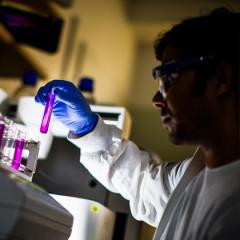Leading American biotechnology company Amyris, Inc. and the Australian Institute for Bioengineering and Nanotechnology at The University of Queensland have signed a Memorandum of Understanding to support the development of a Queensland-based biotechnology industry using feedstock from local sugarcane.
Queensland Premier Annastacia Palaszczuk welcomed the agreement between Amyris and UQ, saying that it helped underpin the biofutures sector in Queensland.
“This is an important research alliance, with profound implications for our sugar industry as well as our emerging biofuels and bioproducts industries,” Ms Palaszczuk said.
The collaboration will identify target products of regional interest, develop the required production technology and scale-up production in collaboration with the $2-billion Queensland sugar industry.
AIBN researcher Professor Lars Nielsen said industrial biotechnology is a valuable opportunity for the sugar industry to diversify.
“Cane juice is the ideal feedstock for bio-refineries by combining good value, high purity and excellent greenhouse gas abatement potential,” Professor Nielsen said.
“A multi-product refinery may use several hundred thousand tonnes of sugar per year.”UQ researchers will gain access to Amyris’ Automated Strain Engineering (“ASE”) platform, which is capable of delivering the fastest engineering worldwide of a microorganism target from identification to production.
The value of the platform has been demonstrated through the production of several isoprenoids, which are a rich class of organic compounds that can be used as a sustainable alternative to petro-chemicals in everything from cosmetics to rubber, and biofuels. The ASE platform can generate and screen 1,000 strains per month.
“Amyris has transformed industrial biotechnology through the ASE platform. What used to take years, can now be achieved in months, and we will look to identify and produce commercially viable strains during the life of the project,” Professor Nielsen said.
UQ’s involvement with Amyris began through the Queensland Government’s 2010 Queensland Sustainable Aviation Fuel Initiative, which studied the feasibility of locally producing aviation biofuels using Queensland sugar.
Amyris President and CEO John Melo said, “This agreement provides Queensland the opportunity to apply biotechnology to help solve the production needs of industry using a readily available local commodity as a feedstock.”
“Access to the ASE platform will provide Queensland with a unique opportunity to accelerate research and development, and capture market opportunities for renewable products in the Australasian region,” he said.
“We plan to work with Queensland to select and prioritize molecules that can potentially be the most disruptive and beneficial in the region.
“We look forward to take the collaboration with UQ and Queensland to the next level, and start a development program with the intention of reaching industrial scale in three-to-four years.”
Media: Darius Koreis, d.koreis@uq.edu.au, +61 7 3346 3962, +61 427 148 187; Professor Lars Nielsen, +61 7 3346 3986, lars.nielsen@uq.edu.au.


